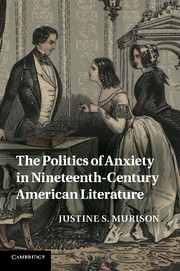Book contents
- Frontmatter
- Contents
- Acknowledgments
- Introduction
- 1 A bond-slave to the mind: sympathy and hypochondria in Robert Montgomery Bird's Sheppard Lee
- 2 Frogs, dogs, and mobs: reflex and democracy in Edgar Allan Poe's satires
- 3 Invasions of privacy: clairvoyance and utopian failure in antebellum romance
- 4 “All that is enthusiastic”: revival and reform in Harriet Beecher Stowe's Dred
- 5 Cui bono?: spiritualism and empiricism from the Civil War to American Nervousness
- Epilogue: the confidences of anxiety
- Notes
- Index
- CAMBRIDGE STUDIES IN AMERICAN LITERATURE AND CULTURE
4 - “All that is enthusiastic”: revival and reform in Harriet Beecher Stowe's Dred
Published online by Cambridge University Press: 01 June 2011
- Frontmatter
- Contents
- Acknowledgments
- Introduction
- 1 A bond-slave to the mind: sympathy and hypochondria in Robert Montgomery Bird's Sheppard Lee
- 2 Frogs, dogs, and mobs: reflex and democracy in Edgar Allan Poe's satires
- 3 Invasions of privacy: clairvoyance and utopian failure in antebellum romance
- 4 “All that is enthusiastic”: revival and reform in Harriet Beecher Stowe's Dred
- 5 Cui bono?: spiritualism and empiricism from the Civil War to American Nervousness
- Epilogue: the confidences of anxiety
- Notes
- Index
- CAMBRIDGE STUDIES IN AMERICAN LITERATURE AND CULTURE
Summary
Although the desire to acquire the good things of this world is the dominant passion among Americans, there are momentary respites when their souls seem suddenly to break the restraining bonds of matter and rush impetuously heavenward.
Alexis de Tocqueville, Democracy in America (1835)When Amariah Brigham, physician and Utica Asylum superintendent, published his medical inquiry into the 1830s revivals centered in upstate New York and the Western frontier, he found himself courting religious controversy. Not that this was unexpected. In Observations on the Influence of Religion upon the Health and Physical Welfare of Mankind (1835), he notes his embarrassment in trying to account for the “gravity” of the subject without questioning the religious beliefs of those he discusses. Arguing that religious worship is progressive and that it has become “more pure and spiritual as mankind have progressed in knowledge,” he laments what he sees as the unfortunate recidivism of the revivals surrounding him in upstate New York. He concentrates his intervention therefore on what he believes are the physiological facts about revivalism: The religious enthusiasm displayed at revivals is a “nervous affection,” and its operations on the body can be accounted for by the “important but still mysterious subject” of animal magnetism. In Brigham's diagnosis, the bodily exercises – the fainting, sobbing, and groaning at revivals – are the symptoms of a nervous system run amok and are a profound threat both to the health of all citizens and to “reasonable,” “calm,” and progressive Christianity.
- Type
- Chapter
- Information
- Publisher: Cambridge University PressPrint publication year: 2011

